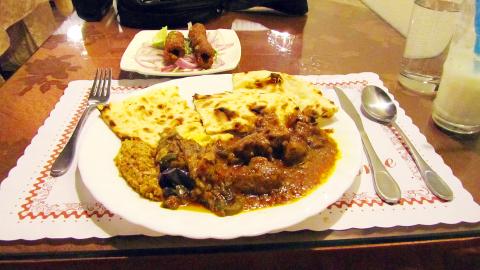Ali Baba’s has long been a fixture on Nanjing East Road, serving up some of the best Indian food to be found in Taipei. In truth there isn’t much competition, with visits to other curry restaurants in
the capital tending to provide dining experiences running from the disappointing to the downright awful.
The decor at Ali Baba’s is showing its age a bit — and dark brown is perhaps not the most inspiring choice of paint color for the ceiling — but the food consistently hits the mark, a fact highlighted by the number of South Asian habitues.

PHOTO: TONY PHILLIPS, TAIPEI TIMES
If you are unfamiliar with Indian food, the extensive buffet is a good way of testing the culinary waters. There are mutton, chicken, seafood and vegetable curries, chutneys, different types of starters, rice, naan bread and even desserts and fruit. In short, if you’re unable to find something to suit your tastes, Indian food probably isn’t for you.
The buffet, which is usually only served at lunchtime on weekends, costs NT$399 plus service. If the latter charge seems odd for a serve yourself affair, soft drinks such as cola, tea or lassi (a sweet, salty or mango-flavored yogurt drink) are included in the price and will be brought to you by a waiter. Service is invariably willing and friendly.
The a la carte menu contains the usual Indian restaurant staples such as tandoori mixed grill, saag gosht (a spiced mutton and spinach dish), assorted birianis and even a few fish dishes.
There is a fair selection of vegetarian options, including palak paneer, which marries spinach and cubes of paneer, a very mild South Asian cheese with a consistency somewhere between tofu and feta cheese.
The naan breads are freshly baked and include keema naan (stuffed with mincemeat) and garlic naan.
Alcohol is not served, but you can bring your own.
My most recent visit, on a Saturday evening, brought the pleasant surprise of the buffet being available, although the waiter said this was a one-off.
I decided to load up on starters opting for the tandoori chicken, vegetable samosas, pakoras and naan. The dryish, somewhat spicy chicken was nicely complemented by the fresh tasting rings of slightly caramelized onions that it
came with.
The samosas — triangular-shaped pastries stuffed with potato and peas — and pakoras — a kind of onion fritter — were crisp and mildly spiced, accompanied by a somewhat sweet, light green mint and yogurt sauce.
I then tried the mutton korma, accompanied by eggplant curry, daal (a lentil dish), seekh kebab and more naan. Rice may have proven a better option second time round as the naan is filling, especially when combined with the rich korma.
None of the dishes was overly spicy, but if that’s your thing you can always go for the vindaloo on the a la carte menu.
Adding to the authenticity of the experience, there’s a TV screen in the dining area which often has Bollywood style music videos playing or sometimes cricket.
Occasionally the ambience may be disturbed by a shrill squawking, but fear not, it’s only the resident macaw, who from time to time makes an appearance on his perch.

Three big changes have transformed the landscape of Taiwan’s local patronage factions: Increasing Democratic Progressive Party (DPP) involvement, rising new factions and the Chinese Nationalist Party’s (KMT) significantly weakened control. GREEN FACTIONS It is said that “south of the Zhuoshui River (濁水溪), there is no blue-green divide,” meaning that from Yunlin County south there is no difference between KMT and DPP politicians. This is not always true, but there is more than a grain of truth to it. Traditionally, DPP factions are viewed as national entities, with their primary function to secure plum positions in the party and government. This is not unusual

Mongolian influencer Anudari Daarya looks effortlessly glamorous and carefree in her social media posts — but the classically trained pianist’s road to acceptance as a transgender artist has been anything but easy. She is one of a growing number of Mongolian LGBTQ youth challenging stereotypes and fighting for acceptance through media representation in the socially conservative country. LGBTQ Mongolians often hide their identities from their employers and colleagues for fear of discrimination, with a survey by the non-profit LGBT Centre Mongolia showing that only 20 percent of people felt comfortable coming out at work. Daarya, 25, said she has faced discrimination since she

More than 75 years after the publication of Nineteen Eighty-Four, the Orwellian phrase “Big Brother is watching you” has become so familiar to most of the Taiwanese public that even those who haven’t read the novel recognize it. That phrase has now been given a new look by amateur translator Tsiu Ing-sing (周盈成), who recently completed the first full Taiwanese translation of George Orwell’s dystopian classic. Tsiu — who completed the nearly 160,000-word project in his spare time over four years — said his goal was to “prove it possible” that foreign literature could be rendered in Taiwanese. The translation is part of

April 21 to April 27 Hsieh Er’s (謝娥) political fortunes were rising fast after she got out of jail and joined the Chinese Nationalist Party (KMT) in December 1945. Not only did she hold key positions in various committees, she was elected the only woman on the Taipei City Council and headed to Nanjing in 1946 as the sole Taiwanese female representative to the National Constituent Assembly. With the support of first lady Soong May-ling (宋美齡), she started the Taipei Women’s Association and Taiwan Provincial Women’s Association, where she